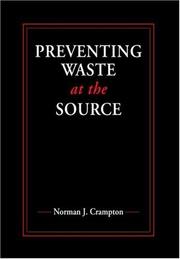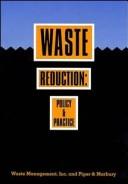Book
ISBN: 9789201054074 Year: 2007 Publisher: Wien International Atomic Energy Agency
Abstract | Keywords | Export | Availability | Bookmark
 Loading...
Loading...Choose an application
- Reference Manager
- EndNote
- RefWorks (Direct export to RefWorks)

ISBN: 1566703174 Year: 1998 Publisher: Boca Raton, FL London Lewis Publications
Abstract | Keywords | Export | Availability | Bookmark
 Loading...
Loading...Choose an application
- Reference Manager
- EndNote
- RefWorks (Direct export to RefWorks)
Book
Abstract | Keywords | Export | Availability | Bookmark
 Loading...
Loading...Choose an application
- Reference Manager
- EndNote
- RefWorks (Direct export to RefWorks)
Anaerobic digestion is by far the most important technology for providing clean renewable energy to millions of people in rural areas around the world. It produces biomethane with anaerobic-digestate as a byproduct that can be used as a biofertilizer. In the context of energy consumption, more than 85% of the total energy consumed currently comes from non-renewable fossil resources. A wide variety of biowastes can be used as feedstocks for biogas production. Biogas technology can provide sustainable, affordable, and eco-friendly green energy along with useful byproducts. This book discusses the basics of biogas production and aims to address the needs of graduate and postgraduate students as well as other professionals through further evaluation of biogas production via case studies.
Book
Year: 2020 Publisher: Basel : MDPI - Multidisciplinary Digital Publishing Institute,
Abstract | Keywords | Export | Availability | Bookmark
 Loading...
Loading...Choose an application
- Reference Manager
- EndNote
- RefWorks (Direct export to RefWorks)
The need for efficient and sustainable management methods of mine waste is continuously growing all around the world. These waste products often present serious management problems due to their more or less significant amounts and possible environmental threats. This Special Issue highlights the recent and new trends in sustainable mine waste management techniques. Currently, it is essential to sustainably manage mine waste, considering social, economic, environmental and technical aspects. In this Special Issue, insights related to the following issues are highlighted: the problems around mine waste, the fine characterization of mine waste, the latest available technical and environmental solutions to efficiently manage mine waste, including treatment and processing before disposal and high value element recovery, with the view of moving towards defining effective, low-cost and ecofriendly methods, the recycling of mine waste products as alternative resources in different sectors, and finally laboratory, pilot and/or industrial-scale studies related to these topics of research. Scientists and industry and governance stakeholders have to face these new challenges to find the best management practices for the future.
Book
ISBN: 9789283322726 928332272X Year: 2000 Publisher: Tokyo: APO,
Abstract | Keywords | Export | Availability | Bookmark
 Loading...
Loading...Choose an application
- Reference Manager
- EndNote
- RefWorks (Direct export to RefWorks)
Book
Year: 2021 Publisher: Washington, District of Columbia : World Bank,
Abstract | Keywords | Export | Availability | Bookmark
 Loading...
Loading...Choose an application
- Reference Manager
- EndNote
- RefWorks (Direct export to RefWorks)
Pakistan, India, and Nepal share one common ecological characteristic: the snow-capped mountain peaks of the Himalayan mountain range. The mountains bestow these countries with pristine landscapes and are the headwaters of many rivers. Concurrently, this unique mountain ecology offers these countries an opportunity to foster a green economy that leverages these natural assets for economic growth. However, these mountain ecosystems are fragile and must be well managed to ensure the livability of communities and environmental sustainability. Continued urbanization, rapidly increasing population, and a steady influx of tourists in mountainous regions in India, Nepal, and Pakistan are straining these fragile ecosystems and are a significant cause of indiscriminate solid waste dumping. Solid waste management (SWM) is a challenge that negatively impacts the economic growth potential in these regions by contributing to poor aesthetics and cleanliness, odor, and leaching pollution into the ground water sources, among others. Chapter one gives introduction. Chapter two discusses the current landscape of the SWM sector in India, Nepal, and Pakistan. Chapter three looks at the complexity of managing solid waste in mountain areas as well as the various challenges and opportunities that arise. Chapter four presents the field study conducted in the mountain areas of the three countries. Chapter five presents a framework or foundation on which solutions can be steadily built and presents recommendations and related implementable actions along a phased approach. In conclusion, chapter six briefly summarizes the role of the World Bank in the SWM sector and how it can provide support to clients to improve SWM services and practices in mountain areas in the South Asia region and elsewhere.

ISBN: 1558402721 Year: 1990 Publisher: New York (N.Y.): Executive enterprises publ.
Abstract | Keywords | Export | Availability | Bookmark
 Loading...
Loading...Choose an application
- Reference Manager
- EndNote
- RefWorks (Direct export to RefWorks)
Book
Year: 2006 Publisher: [Washington, D.C.] : U.S. Environmental Protection Agency, Office of Solid Waste,
Abstract | Keywords | Export | Availability | Bookmark
 Loading...
Loading...Choose an application
- Reference Manager
- EndNote
- RefWorks (Direct export to RefWorks)
Book
Year: 1999 Publisher: [Washington, D.C.] : U.S. Environmental Protection Agency, Solid Waste and Emergency Response,
Abstract | Keywords | Export | Availability | Bookmark
 Loading...
Loading...Choose an application
- Reference Manager
- EndNote
- RefWorks (Direct export to RefWorks)
Book
Abstract | Keywords | Export | Availability | Bookmark
 Loading...
Loading...Choose an application
- Reference Manager
- EndNote
- RefWorks (Direct export to RefWorks)

 Search
Search Feedback
Feedback About UniCat
About UniCat  Help
Help News
News